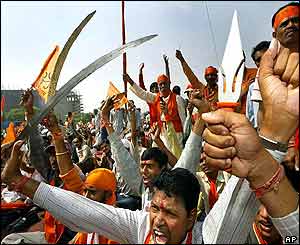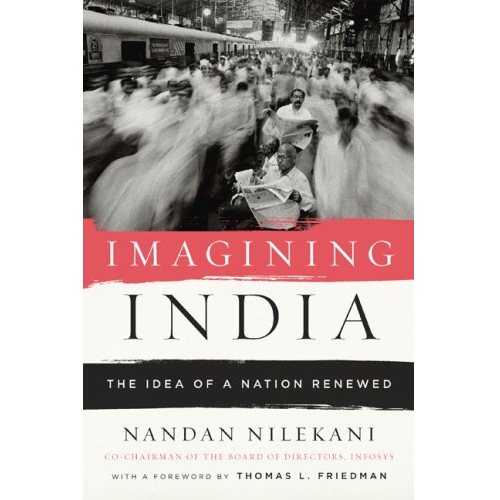Just this other day, I was talking to a friend about the book Imagining India. Both of us had equal experience with the book, we had both read about 80 pages (he is my namesake too by the way). Sometime this year, in the long 30 hour cross Atlantic journeys that I have planned, I will finish it.
We discussed the pros and the cons of the book, he felt that it was written for a Western audience, I probably am not very perceptive and am also too easily gullible to any thought stream coming from any book. So I loved every page of it. I have read many books on post Independent years in India and how we struggled with our many cows and humans and how one Mrs Gandhi did a coup on her own government and stuff like that. There wer books written by famous and not so famous Western and at times desi authors depicting the nation as one big chaotic place and how if one was open-minded, he or she would experience the ultimate miscellany in culture, food, languages, sport (as long as it is cricket and criket alone), and Bollywood. I was a big fan of these books till one morning I realised that they are all so similar - they carry pictures of Goddess Durga with her thousand heads or of kids playing gully cricket or of Elephants on the road giving 'dokku' to people. But this new book that I read gave perspective on how India changed herself economically over the years to emerge from the dark economic ruins it was confined to due to overtly social policies to the brighter side of the world.
 |
| Elephant giving 'dokku' |
- Ramayan and Mahabharath were actually launched in India for a reason: Post Independent India identified itself as one for a brief period. Slowly as the effects of unity of Independence wore off, the incumbent government found the need to unite the people on some aspect, and thats when it hit upon this idea, the idea that made people from Kashmir to Kanyakumari tune into DD every Sunday morning and watch arrows meeting each other in mid air, one flaming, the other dousing it with instant rain thereby symbolising victory (in that round at least... there are usually five to six such rounds before the eventual victor is decided) for the launcher of that arrow. Televising these two bottomless epics seemed like the best thing to happen to DD (before the advent of Junoon, would you say?).
- The author describes how India could have easily sat on the bus that travelled to free market land and how that would have given us a headstart on the progress that many Asian economies made sooner than we did. Instead we tried to appease every community possible whenever they raised a question on the basis of Language, Caste, and what not. When we were fighting over whether Hindi should be a first language or not (there are some people down south that were pretty seriously voting against it), Singapore put an end to whether it should adopt Tamil or Malay or Mandarin, and imposed English as the first language. This country, the most globalised in the world, saw its English patronage grow in leaps and bounds soon after this decision was taken. We are still wondering in 2010 if Ayodhya should belong to Ram or Allah, when long back in China a certain ruler, faced with a similar headache, dispelled all arguments by building a park in that space and declaring it free of religion.
- India had a golden opportunity back in the 60s and 70s that it failed to capitalise on. But now when we have the youngest population in the world and when China's population has just crossed over the peak and will soon have more dependents than independents, we are again going to be thrust into a scenario of demographics, one that we could either construe as an opportunity and ride the success wave or by being lethargic and apathetic, miss the proverbial bus again, this time more dangerously so than the last and mire ourselves in deeper trouble.

 |
| The VHP tribe |
Nandan states seemingly irrefutable facts to back all these up. Sounded exciting to me. Think about it, humans have shaped cars, software, monuments and spacecraft, but none of these would be as complex as shaping a country, a new generation. The latter assumes importance of a phenomenal magnitude, something that can alter the course of history irrevocably for good or for bad. In our case, this opportunity has the potential to vastly change the face of the world, and how it looks at the brown man, his skills and capabilities.
So my friend and I kind of agreed on all these but with a pinch of krystal. 
Sounds fabulous, very interesting, but how deep down the pit are we in now and if any amount of efforts at all would even come close to solving the deep-rooted problems that we have - poverty, illiteracy, population? That was something to ponder upon, we both fell silent, not wanting to be the first to say something negative.

Sounds fabulous, very interesting, but how deep down the pit are we in now and if any amount of efforts at all would even come close to solving the deep-rooted problems that we have - poverty, illiteracy, population? That was something to ponder upon, we both fell silent, not wanting to be the first to say something negative.
I guess a lot more people would have had confidence if the situation had not been so bad, if we had gotten at least the basic things right, but not many want to climb the tallest mountain.
After all, who knows if we all actually get seven lives, and even if we do, what is the surety that this is not the seventh. If it is, it is game set and match for us after this! So, the thought of giving up on a good life chasing this elusive holy grail is frightening indeed.
After all, who knows if we all actually get seven lives, and even if we do, what is the surety that this is not the seventh. If it is, it is game set and match for us after this! So, the thought of giving up on a good life chasing this elusive holy grail is frightening indeed.
 |
| Krishnan |
We should support such efforts, in any way we can. From signing online petitions to oppose the way in which the CWG is being organised to conducting skype sessions to impart knowledge through distance learning, to spending an hour every week in orphanages to becoming into one of the above stories yourself - there are millions of ways in which we can help, offer our invaluable support to these brave warriors, the ones that chose to climb the mountain that we find unsurmountable. Only we should do it truthfully. Not out of guilt or out of a sense of obligation, but out of a positive attitude that our actions are bringing about a change.
 |
| 'Payir' Senthil |
Nandan has proved yet again, at least to me, the power of a good book. You can do zero action, but write one inspiring book in your lifetime and you would have sent a million thoughts scrambling in order to rearrange ones priorities. Wings of Fire

was case in point #1, to an extent The Great Indian Dream,

and then surely, Imagining India.
Together we can, together we should!

